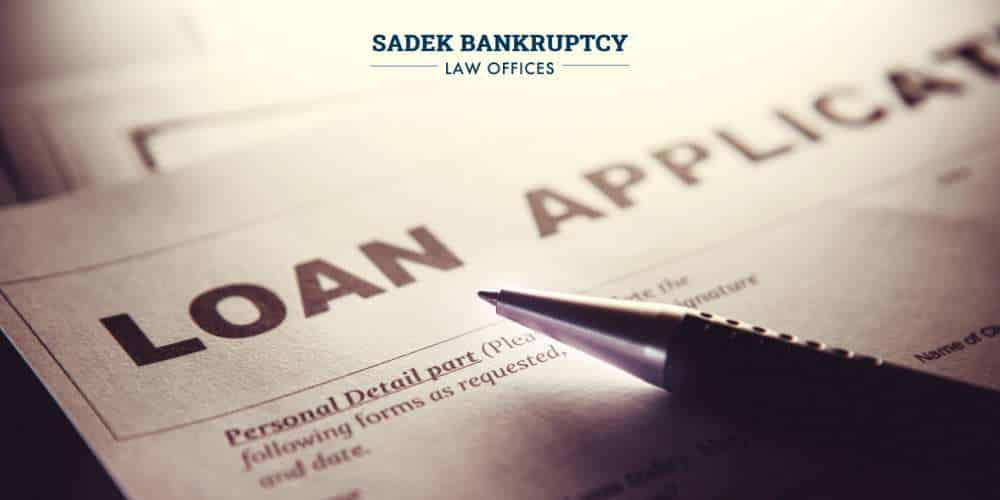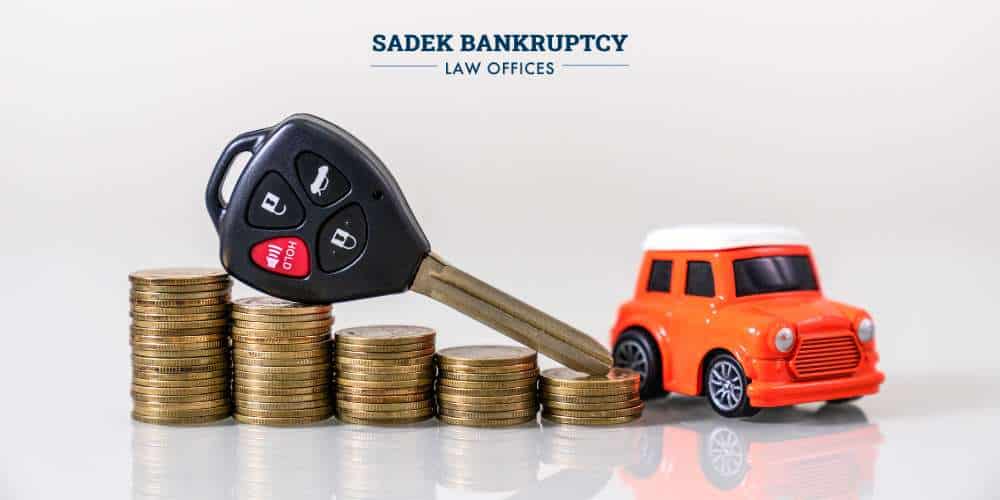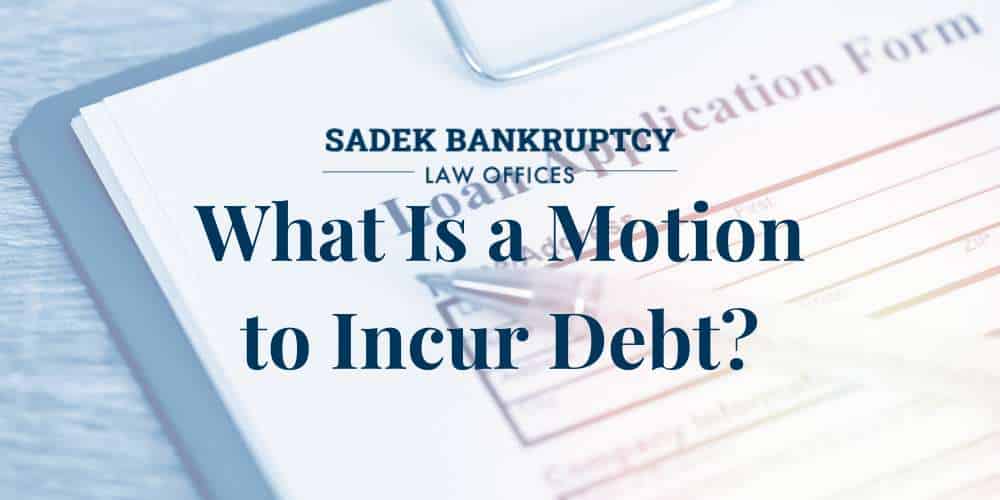Motions to Incur Debt in Pennsylvania and New Jersey Bankruptcy Cases
Finding yourself in the midst of bankruptcy can feel overwhelming, especially when you are faced with managing post-petition debts or considering taking on new debt. You might wonder, “How can I handle unexpected expenses without derailing my financial recovery?” This is where a motion to incur debt comes into play.
Understanding how to handle this process can make a significant difference in your bankruptcy journey. At Sadek Bankruptcy Law Offices, we’ll make sure you understand what a motion to incur debt entails and how working with our skilled bankruptcy team can help. We will ensure that you make informed decisions about your financial future and make navigating the bankruptcy process in Pennsylvania or New Jersey as smooth as possible.
To schedule a free consultation with a skilled Pennsylvania and New Jersey bankruptcy attorney, please call Sadek Law today at 215-545-0008.
What Is a Motion to Incur Debt in a Bankruptcy Case?
A motion to incur debt in a bankruptcy case is a formal request made by the debtor to obtain bankruptcy court approval before taking on new debt during the bankruptcy process. Since bankruptcy law limits a debtor’s ability to incur additional financial obligations without oversight, this motion is submitted to the bankruptcy court for review.
The bankruptcy trustee plays a role in evaluating whether the proposed debt is reasonable and in the best interest of the bankruptcy estate. The debtor must demonstrate that the new debt is necessary and will not negatively affect their ability to complete the bankruptcy process.
Getting Bankruptcy Court Approval to Incur Debt in While Bankruptcy
When filing a motion to incur debt, a debtor must demonstrate to the bankruptcy court that taking on new debt is both necessary and manageable. To obtain bankruptcy court approval, the debtor needs to show a clear need for the loan or financial obligation, such as covering essential living expenses or financing a car for work.
Additionally, the debtor should present a plan detailing how the debt will be repaid without jeopardizing their ability to fulfill the terms of their bankruptcy. A well-structured interest rate schedule and realistic repayment plan will help convince the court that the new debt will not overburden the debtor’s finances.
Before incurring debt, it’s important to seek prior approval from the court. If the court is satisfied with the debtor’s explanation and finds that the new debt will not harm the interests of the creditors, the court approves the motion. On the other hand, if the repayment plan is not feasible, or if the debtor fails to justify the necessity of the debt, the court denies the request, leaving the debtor unable to take on new obligations.
Having an experienced bankruptcy attorney can be crucial in these situations. At Sadek Bankruptcy Law Offices, our skilled attorneys can help prepare a compelling motion to incur debt and present the necessary financial documentation to maximize your chances of securing court approval.
How Does the Monthly Payment Amount of a Loan Affect Your Chances of Approval?
The monthly payment amount of a loan plays a significant role in determining your chances of approval for additional debt in a bankruptcy case. The court evaluates whether you can manage the post-petition debt without compromising your ability to make payments on existing obligations.
If the monthly payment is too high, it may raise concerns that the new debt will overburden your finances, making approval less likely. However, if the payment plan is reasonable and fits within your budget, the chances of obtaining approval increase.
Motion to Incur Debt Chapter 7

Chapter 7 bankruptcy is a process where a debtor’s non-exempt assets are liquidated to pay off creditors, offering a fresh start by discharging most unsecured debts like credit card balances and medical bills. However, during the Chapter 7 process, a debtor may still need to take on new debt for essential expenses, such as medical procedures or purchasing a vehicle.
In this case, the debtor must file a motion to incur debt with the bankruptcy court, requesting approval to take on the new financial obligation. The court will assess whether the proposed debt is necessary and manageable without interfering with the bankruptcy process or harming creditors’ interests.
Buying a Car Without Trustee Approval Chapter 7
Buying a car without trustee approval in Chapter 7 bankruptcy can lead to serious consequences for a debtor. Since any major financial transactions during bankruptcy must be reviewed by the court, taking out a car loan without proper approval can violate bankruptcy rules. The car lender might not be aware of your ongoing bankruptcy, but once the court is, it could lead to complications, such as dismissal of your case or loss of bankruptcy protections.
To avoid these issues, it’s crucial to work with an experienced attorney from Sadek Bankruptcy Law Offices. We will help ensure you follow all required steps for incurring debt in bankruptcy and help you avoid possible penalties.
Motion to Incur Debt Chapter 13
Chapter 13 bankruptcy allows debtors to reorganize their finances and repay their debts over a period of three to five years through a court-approved repayment plan. During this process, if a debtor needs to take on new debt for essential expenses, such as medical bills or a car loan, they must file a motion to incur debt.
The court carefully reviews whether the debtor has enough disposable income after making their plan payments to manage the additional debt without jeopardizing the repayment plan. If the creditor files an objection to the motion, the court will weigh the creditor’s concerns before deciding whether to approve the request.
For anyone facing these challenges, Sadek Bankruptcy Law Offices can provide the necessary legal guidance to help debtors navigate this process successfully in Pennsylvania and New Jersey.
Can You Get a Loan While in Chapter 13?
Yes, you can get a loan while in Chapter 13, but you must first seek approval from the bankruptcy court. When applying for the loan, the court will consider factors such as the interest rate and your ability to repay the loan without affecting your Chapter 13 repayment plan.
It’s important to avoid loans with high interest rates, as they may be seen as a financial burden. Additionally, borrowing from a retirement account is generally discouraged, as it can impact your long-term financial stability. In the following sections, we provide more information about getting specific loans while in Chapter 13.
Can You Get Student Loans While in Chapter 13?
Yes, it is possible to get student loans while in Chapter 13 if you can obtain approval from the bankruptcy court. You must obtain this approval before incurring any new debt. The court will review the loan terms to ensure it will not disrupt your ability to meet your repayment plan obligations. It’s important to remember that many people actually file for bankruptcy because of their student loan debts. A student loan bankruptcy attorney with our firm can help you determine whether your student loans are eligible for discharge through the bankruptcy process.
Can You Get Personal Loans While in Chapter 13?
If you can get court approval, you can secure a personal loan in Chapter 13. This court approval is necessary to obtain before you can borrow money or assume any new debt. As long as the new loan will not disrupt your Chapter 13 repayment plan or financial situation, you have a good chance of approval.
Can You Get Installment Loans While in Chapter 13?
If you need an installment loan for urgent expenses, such as medical emergencies, the court will evaluate whether the loan fits within your existing payment plan. Should the court approve it, you will be able to take out installment loans while in Chapter 13. Demonstrating that the loan is necessary and manageable is key to gaining approval.
Can I Get a Payday Loan While in Chapter 13?
Obtaining a payday loan while in Chapter 13 is generally not allowed without court approval. Payday loans often involve high interest rates and short repayment terms, which can complicate your ability to manage post-petition debt. Before attempting to incur debt, you must seek permission from the bankruptcy court to ensure it does not interfere with your Chapter 13 repayment plan.
Can You Buy a Car While in Chapter 13?

Yes, you can buy a car while in Chapter 13 as long as you obtain court approval for the purchase. The bankruptcy court will review your request to ensure that taking on a car loan does not exceed your maximum debt limit or disrupt your existing repayment plan.
What If I Buy a Car While Under Chapter 13 Without Trustee Permission?
If you buy a car while under Chapter 13 without obtaining trustee permission, you could face serious complications. Unauthorized purchases can be considered a violation of bankruptcy rules, potentially affecting your bankruptcy estate and the handling of post-petition debts.
The court may view the transaction as a breach of your repayment plan, which could lead to penalties, such as the dismissal of your case or loss of bankruptcy protections. To avoid these issues, it’s crucial to seek approval before making significant purchases during your Chapter 13 plan.
Contact a Pennsylvania and New Jersey Bankruptcy Attorney at Sadek Law Today
Handling a motion to incur debt can be stressful, but you don’t have to manage it on your own. If you’re dealing with post-petition debts and need assistance with maintaining your bankruptcy plan, Sadek Bankruptcy Law Offices is here to offer compassionate guidance.
Contact us today for a free case evaluation, and let our experienced bankruptcy attorneys help you address your debt problem effectively. Your journey to financial stability begins with the right legal support. Reach out to us to ensure you make informed decisions for your future.





